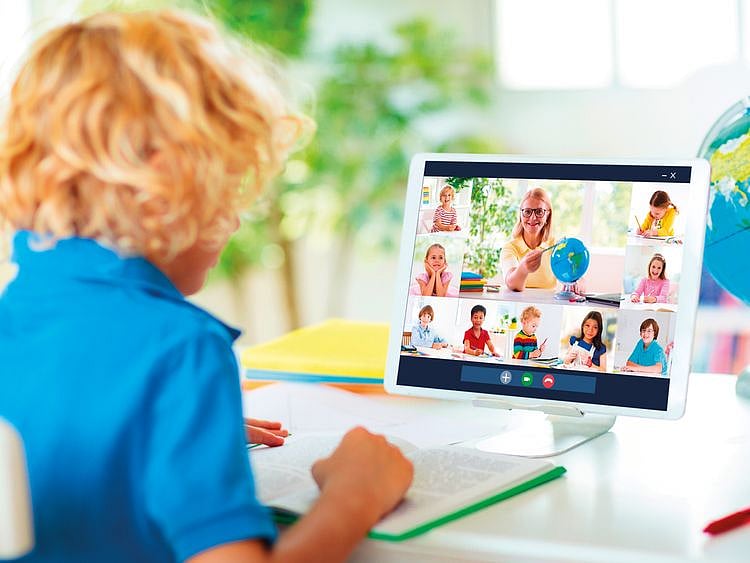Corona-induced learning loss in children is for real in both academic learning and areas of social and emotional skills, alarmed educators from across the world have said. Several reports have emphasised that students have already lost a significant amount of earned achievement levels over the extended period of remote and blended learning.
In a recent survey by McKinsey & Company, teachers globally have highlighted that a computer is no match for a classroom as a place for kids to learn. While the pandemic has forced schools to adopt e-learning, the survey suggests that students have paid a heavy price in lost learning.
While the quality of remote lessons has improved in the past 12 months with most schools adopting best practices in online instructions, it remains challenging for students who struggle with issues such as learning difficulties, isolation, or a lack of resources. From missed assignments to falling test scores, teachers have noticed the disengagement and learning loss, the effects of which could impact the well-being of some students for life, the study states.
Address the achievement gap
After transitioning successfully from in-person to e-learning last year, schools in the UAE have now adopted hybrid approaches, offering a mix of face-to-face and remote learning. To mitigate the impact of extended virtual and blended education, schools are constantly finding new ways to address the learning gap, introducing unique solutions previously considered challenging to implement.
“Learning loss requires long term solutions,” says Hesham Abdeen, Head of Accreditation and Evaluations, Bukhatir Education Advancement & Management (BEAM).
“Remote learning cannot replicate in-person experience. However, delivering influential teaching allows students to meet expected standards. To lessen the inevitable gap, we addressed the social and emotional needs of all learners and increased parents’ partnership. The introduction of high-quality digital learning resources and the heavy focus on formative assessment are key to reduce the learning gap significantly,” explains Abdeen.
E-learning at SABIS schools is also designed as an equivalent experience to that of learning on campus and students are still able to engage with their teachers and attend virtual classes that resemble in-person lessons.
“As part of our programme, students attend the classes they always have, including art, music, and even physical education,” says Rami Malak, Deputy Regional Director for Academic Operations, SABIS Regional Center – UAE. “To ensure that learning is taking place, students continue to be assigned homework and they are regularly assessed. Teachers also receive data on their students’ progress so they are able to follow-up and provide them with the support they need.”
Engaging STEM activities
Understanding that activity-based, interactive learning makes for an interesting experience for children, schools in the UAE take unique measures to bring real-world problems into the classroom. Exploring creative teaching techniques and using graphics, puzzles and quizzes, schools are looking at ways to create engaging content and learning experience for students, especially for challenging subjects like maths and sciences.
“As science and engineering are all around us, we guide learners to find reliable information. We focus on the fun part of STEM and enable learners to choose their ways of learning, to work creatively, independently, or in virtual groups,” says Abdeen. BEAM has introduced virtual labs and other STEM learning resources to nurture learners’ interest and help them discover their lifelong pathways.
Schools following the SABIS Educational System provide students access to a high-quality, successful, online learning experience based on four core elements: a fully integrated digital curriculum, structural pedagogical methodologies, reliable IT infrastructure, and continuous assessment and follow-up.
“This comprehensive solution supports academic excellence, regardless of the learning environment and is applicable to all subjects including STEM,” says Malak.
“The edtech incorporates the Integrated Learning System (ILS) which enables the teacher to set the class tasks to solve and monitor individual student progress in real-time.“
From a social-emotional standpoint, the student-led SABIS Student Life Organization has had a huge impact on creating a positive online learning experience by reaching out to students who are feeling isolated.
“It has organised a plethora of fun virtual events, offered academic support to their peers, and made a significant difference in the lives of students during these difficult times.”
Parental involvement
Schools in the UAE have also reached out to parents, engaging them in children’s at-home learning to maximise the effectiveness of blended instructions.
“Parents have always been their child’s first teacher. Now, with the advent of distance and blended learning, the educational partnership is more important than ever,” says Dr Becky Berg, Interim Superintendent, American School of Dubai (ASD), which encourages parental involvement in a wide variety of ways such as membership in its volunteer organisations, valuable feedback and insight through surveys and parent-teacher conferences, and participation at parent workshops and events.
“This recent shift in education has reminded us of the value of parental contribution in the learning process. When parents develop a love of learning alongside their children, the role-modelling is powerful. For periods of at-home learning, parents are uniquely positioned to help customise learning experiences and respond quickly to student needs,” says Dr Berg. ■
Sign up for the Daily Briefing
Get the latest news and updates straight to your inbox
Network Links
GN StoreDownload our app
© Al Nisr Publishing LLC 2026. All rights reserved.
